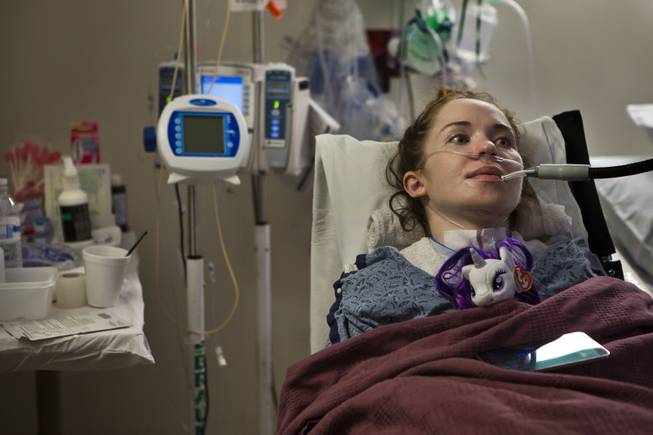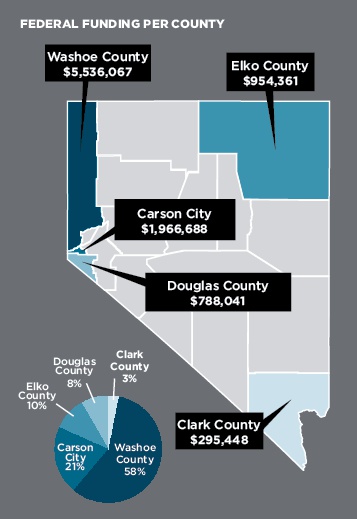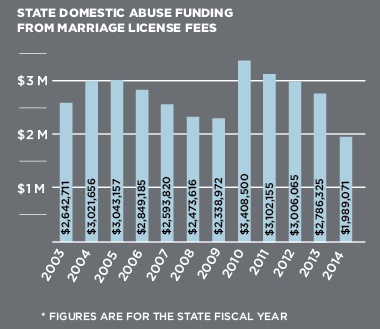
Jessica Small, pictured here Friday, Oct. 17, 2014, was shot and paralyzed from the neck down by her boyfriend in June and has since been undergoing physical and occupational therapy at Spring Valley Hospital.
Monday, Oct. 27, 2014 | 2 a.m.
Where to get help:
Call 911 if you are in immediate danger.
National Domestic Violence Hotline
1-800-799-SAFE (7233)
Advocates are available 24/7 and speak more than 170 languages. Calls are anonymous and confidential.
Safe Nest hotlines
702-646-4981 and 800-486-7282
Safe Nest offers shelter, counseling and advocacy services. Shelter locations aren’t disclosed for the safety of victims and their children.
SAFE House
702-564-3227 (24-hour hotline)
702-451-4203 (counseling and advocacy center)
SAFE House provides shelter at confidential locations, support, advocacy, counseling and community education services.
Shade Tree
702-385-0072
1 W. Owens Ave., North Las Vegas
Shade Tree is 24-hour accessible shelter with 364 permanent beds to serve women and children in need of refuge.
Rape Crisis Center
Hotline: 702-366-1640
The Rape Crisis Center supports victims of sexual abuse and assault in the immediate aftermath of an attack and during the long-term recovery process.
When most people think of domestic abuse, they picture the victim as a young woman.
But here’s the reality: The abused person very well could be a wealthy neighbor who keeps the beatings a secret for fear of social repercussions. Or the quiet husband who’s ashamed to admit his wife throws punches behind closed doors. Or the celebrity whose megawatt smile belies the shoving she endures. Or the woman who confides in police that her female partner loses her temper too often. Or the grandmother who gets pushed around by her impatient son.
On Oct. 20, a 52-year-old man stabbed his ex-wife to death in their home with their children nearby, according to Metro Police. Jodi Joyce suffered a fatal wound to her chest. James Joyce then stabbed himself in the stomach, inflicting critical injuries, police said.
Domestic abuse, which includes emotional and verbal abuse, is all around us, and the number of occasions it rises to physical violence is stunning. Metro Police fielded nearly 60,000 calls last year from people saying they were being assailed by someone in their household.
The actual number of victims is likely much higher still, because many are too scared or ashamed to admit they’ve been abused. For nine of the past 10 years, Nevada has ranked among the top 10 states for the rate of women killed by men, according to the Violence Policy Center. The center’s most recent report, based on 2012 data, ranked Nevada sixth.
Because domestic violence is a shadow crime without a national database tracking numbers, estimating its scope in Las Vegas as it compares with other cities is difficult. But we certainly don’t lack catalysts — booze, drugs, clashing work schedules, gambling, sex and a tough economy.
Not all domestic violence calls merit an arrest. Police pursue charges only when there’s evidence of physical contact. Still, domestic violence snags a good portion of patrol officers’ time, and detectives in the domestic violence unit have some of the heaviest caseloads in the department.
The Clark County District Attorney’s Office typically receives 10 to 20 new cases each day. The cases can be difficult to prosecute when victims — perhaps for fear of reprisals — are unwilling to cooperate.
Witnesses such as neighbors and relatives may hesitate to report suspected domestic violence because they’re unsure if their hunch is correct or they don’t want to meddle in a couple’s personal affairs. But that attitude further emboldens abusers, said Tamara Utzig, director of advocacy at Safe Nest, a shelter operator that last year helped about 30,000 women.
Domestic violence laws apply not only to couples but also to relatives, roommates, domestic partners and children. It’s a crime in which anyone can become a victim.
Privileged
Economic stress certainly can trigger abuse — domestic violence is three times as likely to occur when couples are under financial strain, experts say — but having money offers no immunity from violence. Wealthy people are just as likely to become victims of domestic violence as poor or middle-class people.
They also face unique struggles.
Gated mansions may isolate them. Observers may doubt them, skeptical that someone with such riches could or would succumb to abuse. Some hesitate to report incidents because they fear it will jeopardize their comfortable lifestyles.
“They feel like they have a lot more to lose” in financial and social standings, said Annette Scott, community outreach and education coordinator for SAFE House, a Henderson shelter and resource center for domestic violence victims.
Victims may not show outward signs of abuse — a black eye, swollen lip, unexplained bruising — but suffer from an abuser who exerts control over the checkbook. Many fear the shame and stigma of abuse, especially if they or their abusers hold prominent jobs or roles in the community. The revelation of abuse can shock outsiders who have known the abuser only as the charming man or woman they see in public, Scott said.
Once victims decide to seek help, they may be anxious about moving into a shelter for battered women, with smaller spaces, built-in rules and fewer luxuries.
SAFE House shelters try to offset some of those concerns with suites where mothers and children can stay together with some degree of privacy. The goal is to make the temporary dwellings “as homey as one could expect,” Scott said.
SAFE House has offered refuge to models, professors, bartenders, teachers, bank tellers, lawyers, social workers and housewives, Scott said.
Extended family
The 911 caller indicated her brother-in-law was drunk, armed with a knife and threatening family members inside the home.
North Las Vegas Police arrived and found people outside yelling, including a man with an 8-inch cut on his back. The alleged suspect was a brother-in-law who had been staying at the home for several months, helping to care for an ailing family member. An argument about the brother-in-law’s future at the home had erupted into violence, according to the Sept. 20 arrest report.
The incident might appear as a family argument that escalated out of control, and that’s certainly true to an extent. But it also falls under Nevada’s definition of domestic violence, which includes family members and roommates in addition to intimate partners.
“That squabble might be the first link in that chain,” said Metro Sgt. Blake Smith, who investigates domestic violence cases.
Marlene Richter, executive director of Shade Tree, said the downtown shelter has seen an uptick in the number of women and children seeking help because of an abusive family member who’s not an intimate partner. Since March, about four or five families a month have sought assistance at the shelter.
Many victims had been sharing homes with multiple extended family members whose circumstances forced them to move in together, often to save money. Tight, overcrowded quarters can spawn tensions if a family member tries to exert control.
Similar outbreaks can erupt among roommates, too, perhaps over such issues as the air conditioner setting or where food can be eaten in the house.
“While the intimacy is not there, the cycle of violence is still there,” Richter said.
Shade Tree experienced an influx of victims escaping intergenerational domestic violence several years ago during the height of the recession, Richter said. It’s not clear what’s driving the increase again, aside from speculation that many families still are living together to try to get ahead financially.
A day of domestic violence in Las Vegas:
This is a snapshot of people booked Sept. 23 in the Clark County Detention Center on domestic battery charges. It’s not comprehensive because some arrest reports were unavailable. Also, the crimes were not necessarily committed the day the suspects were booked.
°°°
A husband accused his 29-year-old wife of having an affair, broke her phone, squeezed her neck and threatened to kill her as their children screamed for him to stop. He was booked on a count of domestic battery by strangulation.
°°°
A nine-page arrest report details severe abuse by a suspected pimp. A woman arrived at University Medical Center with a fractured finger that had to be amputated, spinal fractures, bruising all over her body, including on her lung, and open wounds that required skin grafts. The woman told police the man forced her into prostitution and beat her repeatedly for four months using a metal rod, belt buckle, wires and chairs. She also accused him of burning her foot with an iron. The suspect was booked on numerous charges, including domestic battery by strangulation.
°°°
A 7-months-pregnant woman accused her boyfriend of slapping her in the face, knocking her to the floor and cutting the coaxial cables for the televisions and computer. He was booked on a count of domestic battery.
°°°
Video cameras recorded a man driving over a woman’s foot in the parking lot of the Riviera. The man and woman changed their stories multiple times, but the man ultimately told police the couple had been arguing and he accidentally ran over her foot while trying to leave. He was booked on a count of domestic battery.
°°°
A woman accused her boyfriend of grabbing and dragging her after she refused to have anal sex with him. The boyfriend told police his girlfriend was drunk and became aggressive when he didn’t want to have sex with her. Based on the woman’s injuries, police determined the boyfriend was the primary aggressor. He was arrested on a count of domestic battery.
°°°
A woman said her boyfriend was upset that she was spending time with her younger sister. The woman accused the boyfriend of pushing her and making her fall over a chair, hitting her in the face and neck, and shattering her sister’s tablet. He was booked on a count of domestic battery — third offense.
°°°
A man went to the Veterans Affairs Hospital with knee injuries caused by a hammer and a throat injury. The man’s girlfriend told police her boyfriend was irritating her, and they got into a physical fight. She was booked on a count of domestic battery with use of a deadly weapon.
The elderly
Victim advocates say people 18 to 24 years old are at most risk for experiencing domestic abuse. But it’s certainly not a problem limited to young adults.
Shade Tree increasingly has provided refuge for women ages 62 and older escaping domestic violence, Richter said.
Last year, the shelter took in 119 elderly women identified as domestic violence victims, compared with 26 in 2012, Richter said. Their abusers were intimate partners, family caregivers and roommates.
“It’s very profound to see women with white hair and in their 70s saying they wish they had left (their abusers) earlier,” Richter said.
Traditionally, there has been a significant gap between the number of victims 50 and older who access services and younger victims, perhaps because many services seem focused on meeting the needs of younger women and their children. That’s an issue advocates say needs to be examined more closely as the nation’s population ages.
“It’s not that more people abuse elderly people than in the past,” said Monica McLaughlin, senior public policy specialist for the National Network to End Domestic Violence. “It’s probably that we have more elderly people.”
Men are victims, too
She was mad that he left a pot roast out overnight.
She wanted him to give her back her driver’s license and Social Security card.
They drank too many beers while watching television.
They bickered, then fought physically as she drove.
The victims all were men; the aggressors, their wives or girlfriends. Three of the victims were stabbed, and one was killed with a gunshot.
Metro Police doesn’t track the number of male and female domestic abuse victims, but about 75 percent of cases involve male violence toward women, Smith said. Police analyzed cases from a section of the northwest valley and found that in June and July, 250 accused assailants were men and 106 were women.
Male victims typically have fewer places to turn for help. There’s no shelter for battered men, so men and their children get vouchers for hotel rooms, Richter said.
Violence against men may be worse than reported, given men’s tendency to not report abuse. When a local radio talk show about domestic abuse turned to the issue of male victims, the phone rang off the hook for a half-hour with men, cloaked in anonymity, calling in to share their stories.
“It opened the flood gates,” Richter said. “That was one channel, one talk show.”
And domestic violence isn’t limited to heterosexual relationships. The Center for America Progress estimates that domestic violence has occurred in more than a quarter of American same-sex relationships.
Celebrities
As the nation fixated on video showing NFL player Ray Rice brutally slugging his fiancée, another celebrity addressed domestic violence — as the victim.
Meredith Vieira, 60, who shared her story on her new talk show, admitted that, like other victims, it was difficult to leave an abusive boyfriend years ago, despite him shoving her into scalding water and throwing her naked into an apartment hallway.
“We all have to accept the fact that it’s not just an issue with the NFL,” Vieira said. “It’s an issue with all of our lives. Until we take it seriously, more and more women are going to get abused.”
In August, porn star Christy Mack suffered 18 broken bones, shattered teeth and a ruptured liver when her ex-boyfriend, former UFC fighter Jonathan “War Machine” Koppenhaver, allegedly beat her inside a Las Vegas home. He was found and arrested in California.
Mack showed her black eye and swollen, bloody lips on Twitter.
“I believed I was going to die,” she wrote. “He has beaten me many times before, but never this badly.”
Koppenhaver is in jail, awaiting trial on numerous charges, including attempted murder, domestic battery and sexual assault. Jail authorities said he tried to hang himself with a bed sheet and was put on suicide watch.
In Southern Nevada
The woman showed up at her neighbor’s house naked, except for the black tape and necktie wound around her throat. She couldn’t walk.
Her husband, who recently had been jailed for beating her, had come back, according to a Metro Police arrest report detailing the July incident. The husband claimed to be having an asthma attack and needed his inhaler. She opened the door.
Inside, the abuse began again. He beat her, bound her hands and feet, choked her unconscious, whipped her with an electrical cord, stabbed her toenails with sewing needles, burned her feet with an iron and rubbed her genitals with a Clorox wipe.
Eventually, she jumped out an upstairs bedroom window and, after her husband dragged her back inside, fled through the front door.
If this sounds too horrific to believe, think again.
“Those kind of cases come in pretty regularly,” said Richard Scow, chief deputy district attorney.
Scow’s office sees at least one or two cases a week involving severe injuries and significant charges, he said. Metro Police respond to stabbings that result from domestic violence about once a week, Sgt. Blake Smith said.
Smith said he was surprised to see so many felony cases when he joined Metro’s domestic violence unit two years ago.
“We have stabbings, shootings, blunt force object injuries,” Smith said. “We get the cases where (victims) are almost dead.”
Last year, Metro recorded 30 homicides related to domestic violence.
Abusers here tend to use Southern Nevada’s desolate geography to gain control over their victims. The abusers often use a similiar threat: “I could take you out in the desert and kill you, and no one would ever know,” according to Tamara Utzig, director of advocacy at Safe Nest, which provides shelter and counseling to victims of domestic violence. Some victims even have been taken to the desert and abandoned for several hours, Utzig said.
“That fear keeps you afraid to leave,” she said. “People go missing everywhere, but we have these vast lands around us that make it real.”
The abused woman who ran naked to her neighbor’s house was hospitalized overnight. When she was released, she asked police to help her gather belongings from her house because she feared her husband was there. She was right. Police found him hiding in a kitchen cabinet.
Can abusers be rehabilitated?
The short answer is yes, but it hinges on a drastic change of attitude, according to marriage and family therapist Dennis Henson.
For male abusers, the problem often is rooted in a profound disrespect for women and an overall sense of superiority, said Henson, who helps run 13 batterer intervention programs at Safe Nest.
The groups, two for women and 11 for men, address issues such as the cycle of violence, stress management, socialization between genders, conflict resolution, parenting, substance abuse and communication. Most participants are court-ordered to attend.
During classes, Henson pays attention not only to how abusers react to discussions but how they interact and what they say to one another when they think instructors aren’t watching.
“If we see an attitude change toward the positive, we typically say we have a pretty good chance (of rehabilitation),” Henson said. “If not, our prognosis would be guarded.”



Join the Discussion:
Check this out for a full explanation of our conversion to the LiveFyre commenting system and instructions on how to sign up for an account.
Full comments policy